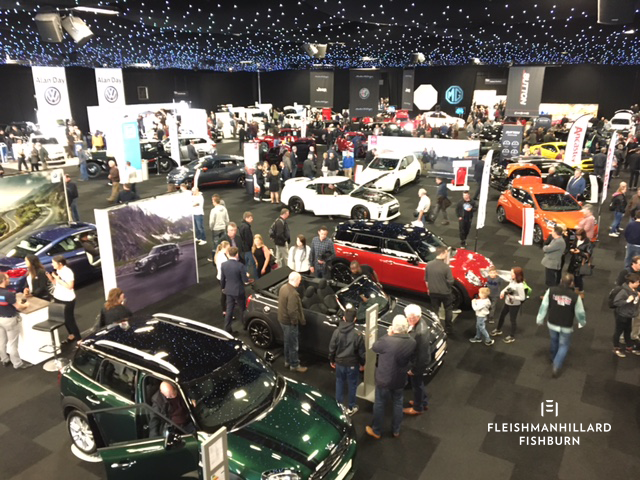TechMunch: The London Motor Show: What’s happening in the motor industry?
Last week FHF descended on the London Motor Show. As the industry transforms itself from nuts and bolts manufacturing firms, to highly innovative tech companies, tech enthusiast Ben Fletcher and Lara Bunston visited London’s biggest motor show to see what’s going on.

British brands are back!
The prospect of Brexit put a gloomy cloud over the British automotive industry, but this was far from evident at the London Motor Show. British heritage dominated!
Gallantly, a wide range of British vehicles exhibited this year; including cars from Rolls-Royce, MG, a remastered Mini designed by David Brown (the same designer behind the Aston Martin DB series), a new TVR boasting top speeds of over 200mph, and the industry dominating Jaguar Land Rover which showed off its recent World Car of the Year with a special edition Jaguar F-Pace.
But cars from overseas also filled the show – glamourous cars from Lamborghini, Ferrari, Porsche, and Maserati graced the show, along with a string of more affordable hatchbacks. Brexit or not, the motor industry doesn’t seem to be phased.
Bidding farewell to the London Taxi…almost
The much loved London Taxi Company is saying farewell to the iconic TX4 black cab. The TX4 was launched in 2007 and after a decade on the scene is being discontinued to make way for a brand new, more environmentally friendly, electric TX5.
For those wishing to pay homage to the legendary car that has at some point got you out of a jam – or into one – there is a giant leaving card at the event for you to sign!
Diversity is on the rise
As cars rapidly transform and innovate in the industry, we’ve not only seen a wide range of car manufactures at the event, but a diverse range of partners, suppliers, tech companies and start-ups. Although this is likely to be the case at shows, it seems to be on the increase. It appears that automotive manufacturers are opting for third party suppliers, rather than innovating in-house.
Take for example an electric car. Batteries are very sophisticated devices, as I’m sure Elon Musk can tell you in great detail. If cars are moving towards electric, is it realistic for traditional automotive companies to design their own batteries, or just outsource for the best available?
We predict that these types of partners will continue to rise – especially in technology – where they’ll be used to build the foundations of electric, driverless, connected and infotainment systems of the future.
Is this where the news is happening?
The London Motor Show historically hasn’t matched the size of other automotive shows in the world, but has still had its mark. The Paris Auto Show or Geneva Motor Show continue to dominate, but over the last couple of years, they’re being matched by an unexpected rival.
We’re seeing consumer tech shows, like CES and MWC, being the chosen platforms for automotive companies to make their biggest announcements. Mercedes, BMW, Faraday and Audi have all used these shows to launch their driverless and electric innovations in recent years.
When we think about it, it’s not that surprising. Automotive companies are transforming into technology companies. The likes of Tesla have been founded by a technology billionaire, and the recent introduction of Apple and Google haven’t exactly had a history in automotive. With constant technology innovation being included in the cars of today, automotive companies are essentially becoming the tech giants of tomorrow.
And this transition is happening in the media. As technology media specialists, we’ve noticed more and more automotive companies being covered by technology websites. This wouldn’t have been the case as little as five years ago. From a business and PR standpoint, this proposes an interesting change for traditional automotive companies as they will soon have to reposition and compete against some of the world’s largest, highly funded and innovative tech companies.
Lara Bunston & Ben Fletcher, Technology
Find Out More
-
Platinum CMS Award
March 13, 2024
-
Changing Communications Tack at Mobile World Congress
February 21, 2024


